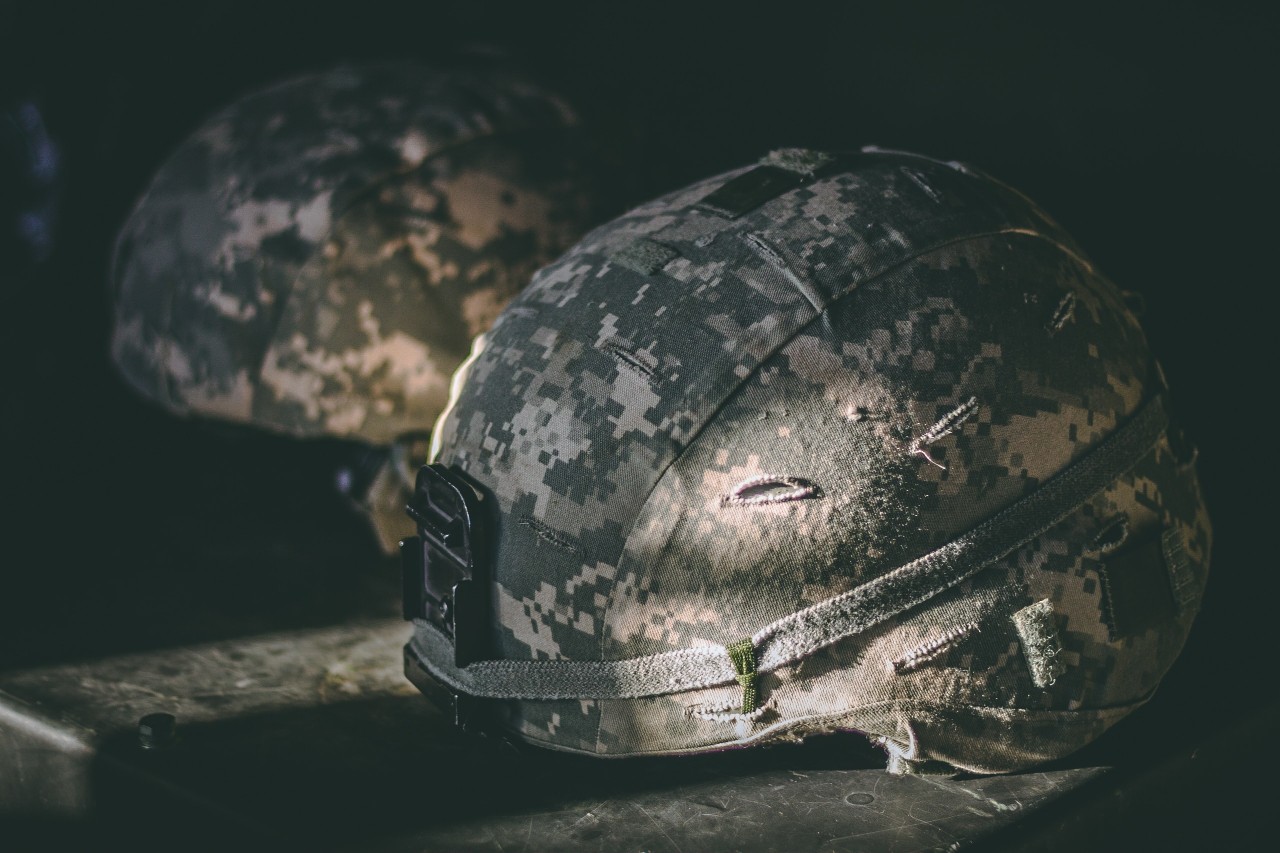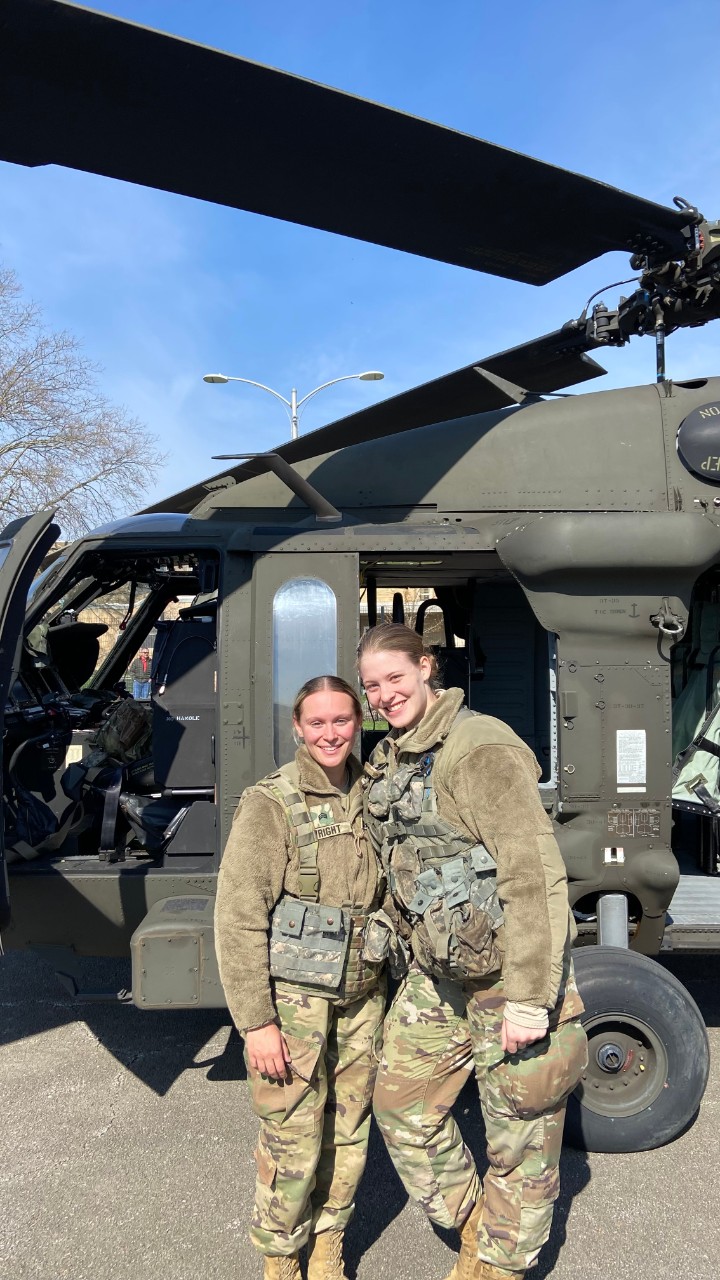
Develop professionalism, leadership through ROTC at UC
ROTC offers tuition-free path to skills development, travel opportunities
Most college students spend their summers catching up on classes and working part-time jobs. Not Alicia Van ‘t Riet, who spent the summer of her freshman year in Kyrgyzstan in Central Asia, and the summer of her sophomore year in Estonia – all without paying a dime.
Riet, a psychology major in the College of Arts & Sciences, has experienced the opportunity to go abroad thanks to being part of the Reserve Officers’ Training Corps (ROTC) at the University of Cincinnati, which partners with the Project Global Officers (Project GO) program. This program provides a fully funded opportunity to study language, culture, and learn leadership skills both abroad and domestically. Riet has found a passion studying Russian.
Established in 1916, ROTC aims to provide college students with the opportunity to receive military training alongside their academic studies. Initially focused on preparing officers for World War I, ROTC has now evolved to cover a wide range of career paths. ROTC offers numerous benefits to college students, such as gaining leadership skills, discipline, and professionalism that sets students up for success no matter what career path they choose.
Although students are given the opportunity to enroll in the ROTC program for up to two years with no obligation, those who wish to continue commit to military service post-graduation, dedicating their junior and senior years of college to training to graduate as an Army Officer. In exchange, ROTC covers the cost of tuition in full.
The ROTC program at UC allows students the chance to learn from officers with extensive firsthand military experience. These instructors bring invaluable experience and depth of knowledge that can only be taught by those who have served.
Major Michael Cary is an ROTC instructor and assistant professor of Military Sciences at UC with over 16 years of military experience.
What we try to instill in our cadets is professionalism and leadership. Those are our primary goals.
Major Michael Cary
While most ROTC students choose to participate in military service following graduation, it’s not required. MAJ Cary emphasizes the universal value of the skills taught in ROTC, whether students choose a military career or a civilian career.
“A common misconception is that we just say things like ‘do pushups, do sit-ups, run 3 miles,’” he says. “We really teach them how to be a good person. We teach them how to dress, we teach them how to talk to people, we teach them a type of discipline that will help them professionally and personally.”

Alicia Van 't Riet (on the right)
Before college, Riet always knew that she wanted to go into law enforcement. Through her study abroad experiences, ROTC training and studying psychology in UC’s College of Arts and Sciences, Riet is learning the skills she needs for a successful career. “You learn a lot about how to connect with people, how to understand them in order to be a better leader for them, understanding the steps to decision making and how different things might influence each step,” she says.
“There’s a lot of self-reflection and self-discovery when you’re sitting in a cold, rainy field, but there’s beauty to that because it shows you a reflection of yourself when you’re completely raw, sitting in a cold, wet field.”
Only two years into college, Riet has already begun to see the enduring influence ROTC is going to have on her life. “It’s a really good opportunity,” she says. “I’m so accomplished now.”
Featured image at top: Military headgear. Credit/Israel Palacio for Unsplash.
By Sydney Asher
Student Journalist, A&S Department of Marketing and Communication
artscinews@ucmail.uc.edu
Related Stories
History Department Lecture
January 9, 2002
Lecture by Allan W. Winkler, Miami University, Oxford on "Urban America in World War II: Cincinnati as an example" at the Cincinnati Museum Center at 7:30pm.
UC Research Ranking Climbs
January 10, 2002
The University of Cincinnati moved up in two different national rankings established by the National Science Foundation (NSF) to compare college and university research efforts.
History Department Lecture
January 17, 2002
Lecture by Leslie Adelson, Cornell University, will deliver a Taft lecture titled "Back to the Future and Beyond 'Two Worlds':Turkish Lines of Thought in Contemporary German Literature and Memory Work" at 3:00pm in the Max Kade German Cultural Center in Old Chemistry.
New Appointments in McMicken Administration
January 21, 2002
The college is very pleased to announce two new appointments.
Sign Up for the Discovering A&S Elective
January 24, 2002
Parent's Asking, "What does someone do with THAT major?" Don't know all your options? Sign up for a 2 credit hour elective where you can meet A&S faculty, emeriti faculty, as well as, alumni.
Three of Four UC Fulbrights Scholars from McMicken
January 28, 2002
Tainted water supplies in Bangladesh, international security and missile defense, transformations in Mexico and greater understanding of India - this varied list sums up the work of four Fulbright Scholars at the University of Cincinnati who are concentrating on real-life issues involving our neighbors around the world.
Prominent Line-Up Examines Race in 2002 Ropes Series
January 31, 2002
The issue of race will receive one of the most intensive examinations undertaken in Cincinnati since the April riots when the University of Cincinnati Department of English launches its Ropes series in January and February 2002.
Nominate a Distinguished Alumni
January 31, 2002
The Purpose of the Distinguished Alumni Awards is to recognize graduates of the McMicken College of Arts and Sciences for outstanding achievements.
UC Physicists Play Important Role in Experiments That Provided New Understanding of Neutrinos
January 31, 2002
Three physicists at the University of Cincinnati played a key role in recent experiments which provided a surprising new understanding of a tiny subatomic particle known as the neutrino.
Angelene Jamison-Hall: Publishing Award
February 13, 2002
An unpublished novel by Angelene Jamison-Hall won first place in the new writing contest sponsored by River View Publishing in Riverside, Iowa.